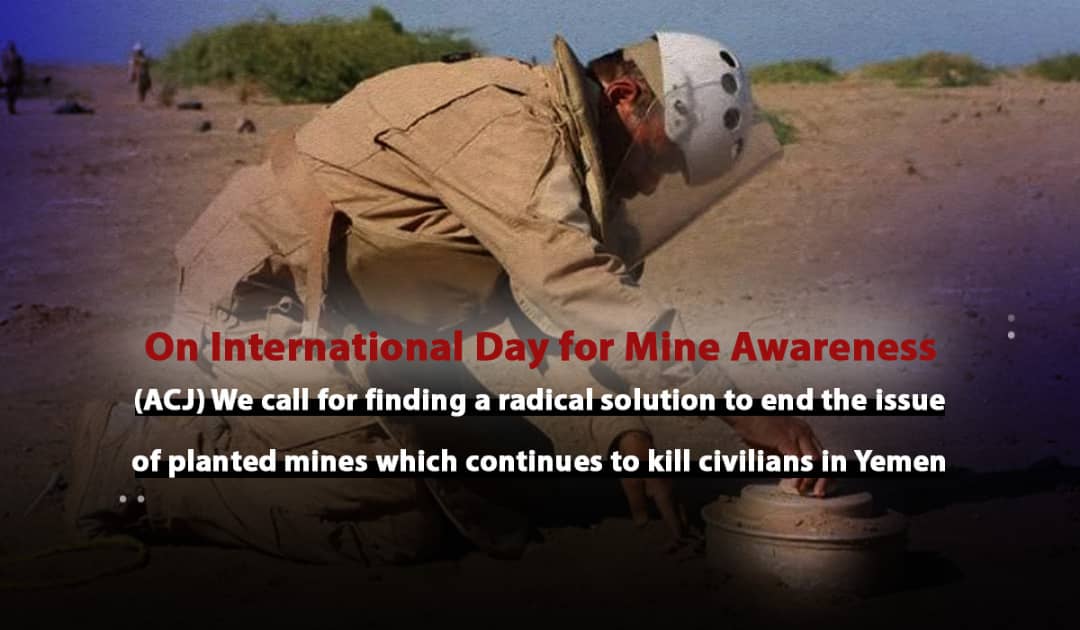

Michigan - The American Center for Justice (ACJ) said that millions of Yemenis were still facing the danger of mines and unexploded ordnance more than ever before due to the accumulation of this issue and the lack of finding radical solutions, taking into account that the number of casualties among civilians, especially children, keeps increasing.
The ACJ notes during its statement issued on the International Day for Mine Awareness, corresponding to April 4 of each year, that the numbers documented by the center and many human rights organizations during the years of war in Yemen showed there were thousands of civilian casualties, both dead and wounded. While tens of thousands of them are still at risk in light of the non-disclosure of their locations, noting that Taiz Governorate is considered one of the most mine-contaminated areas in Yemen.
Regarding the latest incidents resulting from the explosion of mines, the Center stated that three civilians were killed and a fourth was injured on Tuesday, 04/02/2024, in two incidents of the explosion of a landmine and an object left over from the Houthi group in areas under the control of the Yemeni government in the Marib and Lahj governorates.
A civilian was killed and another was seriously injured as a result of a military object exploding while being tampered with in the vicinity of the Habbab School in the Habbab area of the Sarwah District, west of Marib province. The others, Hawash Muhammad Jahaif and Fadl Saleh Hajaif, were killed by a mine explosion while riding on a motorcycle on a side road in the Kahboub area of the Mudaraba District in Lahj province.
These two incidents took place just less than three days after 8 civilians, including a child, were injured of varying severity, as a result of three incidents of mine explosions and military remnants of war attributed to the Houthis in Taiz and Al-Bayda governorates.
The ACJ notes that in April 2022, it had launched a report entitled “Mines.. Blind Killer,” which monitored and documented cases of killing, injury, and property destruction, as a result of mines that were planted exclusively by the Houthi militias.
In addition to the horrific numbers recently published by UN and official Yemeni reports, the American Center for Justice indicated that its field team documented during the time period (June 2014 - February 2022) the killing of about 2,526 civilians, including 429 children and 217 women. Another 3,286 people were injured, including 723 children and 220 women, in 17 Yemeni governorates, and 75% were exposed to permanent disability or mutilation.
The report concluded that the Houthi group practices the systematic planting of antipersonnel and locally manufactured mines in all the military sites it controls and in the areas and roads from which it withdraws randomly without any military necessity.
In regard to the impact of these mines, ACJ said that the Houthi group planted mines in villages and rural areas, which prevented and hindered the arrival of humanitarian aid to the least vulnerable groups, hindered children’s access to schools, and forced civilians to forcibly displaced from their homes.
Indiscriminate landmines laid by the Houthi group caused large agricultural areas to go out of production, disrupted development projects, and obstructed the arrival of humanitarian aid to local communities in dire need. Sea mines deployed by the Houthis in the Red Sea threaten international commercial shipping and the lives of traditional fishermen.
The ACJ stresses that the high number of casualties is due to the Houthi group planting mines in areas close to residents, public roads, farms, and grazing places without maps, which makes it very difficult to know the locations of these mines. This reason has contributed to a significant increase in the casualty rate among civilians.
The Center emphasizes that the health, psychological and social suffering of mine victims is exacerbated due to the weak health infrastructure and the inability to provide treatment, especially the provision of prosthetic limbs, as most victims travel outside Yemen for treatment. They have to travel to countries like India, Egypt and the Sultanate of Oman, where the Arabian Prosthetics Center is located.
It must be emphasized that the use or possession of mines is prohibited under relevant international covenants and treaties, such as the Ottawa Mine Ban Treaty, the United Nations Convention on Conventional Weapons, and the Rome Statute, These conventions consider that mines that target civilians who do not participate in military operations may amount to war crimes and thus require accountability, in addition to the Universal Declaration of Human Rights and the International Covenant on Civil and Political Rights, which criminalize any violation of physical integrity or the right to life.
The American Center for Justice (ACJ) calls on the United Nations and special procedures related to mines to take serious and effective action to eliminate mine- related violations in Yemen, pressure the Houthi group to hand over maps of the locations of these mines, send specialized teams to dismantle them, provide basic health and psychological services to mine victims and form a special fund to support and compensate Yemenis affected by landmines.